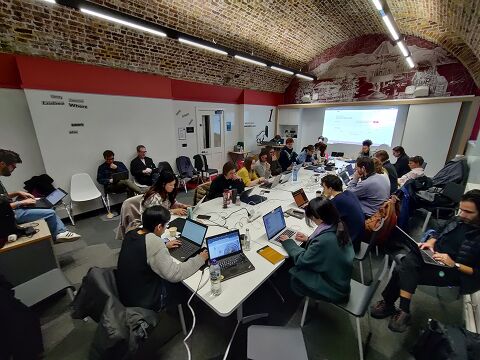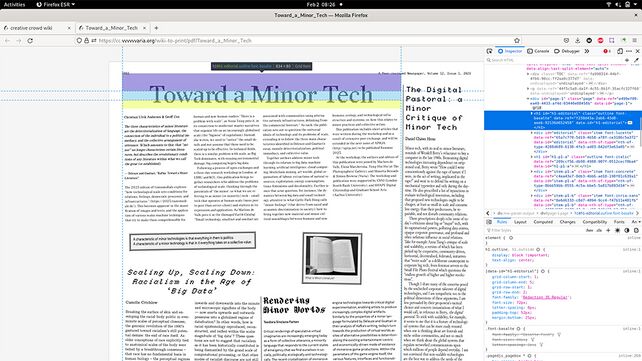Toward a Minor Tech:APRJA-Editorial
Christian Ulrik Andersen
& Geoff Cox
Editorial:
Toward a Minor Tech
Editorial: Toward a Minor Tech
The three characteristics of minor tech are the deterritorialization of technology, the connection of the individual to a political immediacy, and the collective arrangement of its operations. Which amounts to this: that “minor” no longer characterises certain technologies, but describes the revolutionary conditions of any technology within what we call big (or ubiquitous). ––
Deleuze and Guattari, Kafka:Toward a MinorLiteratureTech (18)
This journal issue addresses what we are calling "minor tech" making reference to Gilles Deleuze and Félix Guattari's essay "Kafka: Toward a Minor Literature" (written in 1975). They propose the concept of minor literature as opposed to great or established literature — the use of a major language that subverts it from within. "Becoming-minitorian" in this sense — to use a related concept from A Thousand Plateaus — involves the recognition of particular instances of power and the ability of the repressed minority to gain some degree of autonomy of expression. "Expression must break forms, encourage ruptures and new sproutings", as Deleuze and Guattari put it (28).
A characteristic of minor technologies is that everything in them is politics.
For our purpose, this notion of the minor is a relative position to major (or big) tech. This also partly invokes the issue of scale, the theme of the 2023 edition of transmediale festival. In the call, the organizers state that the festival is an exploration of “how technological scale sets conditions for relations, feelings, democratic processes, and infrastructures.” (https://2023.transmediale.de/). The importance of scale becomes apparent in the massification of images and texts on the internet, and the application of various scalar machine techniques that try to make things comprehensible for human and non-human readers alike; big computing begets big data. However, “we have a problem with scale”, as Anna Lowenhaupt Tsing puts it (37), in its connection to modernist master narratives that organise life on an increasingly globalised scale (the 'bigness' of capitalism). Alternatively, she writes, we need to “notice” the small details and not assume that these need to be scaled up to be effective, as is the orthodoxy of research. In technical fields, not least machine learning, this problem with scale has severe consequences, with ensuing discrimination and environmental damage.
A minor technology is that which a minority constructs within the grammar of technology.
Small tech on the other hand operates at human scale (more peer to peer than server-client) and "stutters and stammers the major" (to use the words of Deleuze and Guattari once more). More pragmatically, as artist-researcher Marloes de Valk puts it in the Damaged Earth Catalog: “Small technology, smallnet and smolnet are associated with communities using alternative network infrastructures, delinking from the commercial Internet.” Further issues that arise from scale question the paradigms of 'big computing'; for instance, the dynamics between big data and small technology, attentive to what Cathy Park Hong calls “minor feelings” (that derive from racial and economic discrimination in society); how to bring together new material and minoritarian cultural assemblages between humans and nonhumans, ecology, and technological infrastructure and systems; or, how this relates to minor practices and collective action. Although, ultimately, notions of big or small become less important, and everything is to be considered political (or micropolitical) if we follow our conceptual trajectory.
As such, this publication sets out to question some of the major ideals of technology and its problems of bigness, extending it to follow the three main characteristics identified in Deleuze and Guattari's essay, namely deterritorialization, political immediacy, and collective value. We would argue that these remain pertinent concepts: as a means to deterritorialize from repressive conceptual, social, affective, linguistic and technical regimes, and transform the conditions through which technology can become a "collective machine of expression" (Deleuze and Guattari 18).
A characteristic of a minor technology is that in it everything takes on a collective value.

Following a process of open exchanges online and a three-day in-person research workshop in London, at London South Bank University and King's College London, this edition of APRJA brings together researchers who think through the potentials of 'the minor', and what we are referring to as minor (or minority) tech. As stated, this is not a problem of scale alone (although many of the contributions take this approach) but of politics – how minorities struggle for autonomy of expression. Together, authors address minor tech through its relation to a range of pressing concerns, exploring: racism in predictive policing technology; QAnon as an assemblage of ‘minor techs’; speculative practices of 'worlding'; parallels between computing and the craft of weaving; artistic tactics in opposition to large-scale digital platforms; attempts to decentre Western epistemologies through spirit tactics and (techno)magic; parallels between planetary-scale computation and a philosophy of mind; problems associated with generative large language models; inflated claims of democratizing machine learning; processes of optimisation and our changing experience of time; connections between DAOs, countercultural blockchain and decoloniality; user subjectivity in Mastodon and the Trans*Feminist Servers project; and the final word is with Trans*Feminist Servers whose practice exemplifies the collective value of minor tech.
A minor technology is an intensive utilisation of technology — it utilises the inner tensions of technology.

This publication (APRJA) further develops short articles that were first written during the workshop at speed, published as a newspaper and distributed at transmediale (the PDF can be downloaded from here). As well as exploring our shared interest and understanding of minor tech, our approach has been to implement these principles in practice. Consequently the publication has been produced using wiki-to-print tools, based on MediaWiki software, Paged Media CSS techniques and the JavaScript library Paged.js, which renders the PDF. In other words, no Adobe products have been used. As such the divisions of labour between writers, editors, designers, software developers have been brought closer together in ways that challenge some of the normative paradigms of research process and publication, in keeping with the applied ethics of minor tech.
— Aarhus/London, June 2023
Acknowledgements
Thanks to all contributors and initial workshop participants, including Roel Roscam Abbing, Mateus Domingos, Edoardo Lomi & Macon Holt, Anna Mladentseva, marthe van dessel (alias: ooooo), mika motskobili (alias: vo ezn), ai carmela netîrk, and to Manetta Berends and Simon Browne (Varia) for their design work and the development of the wiki-to-print platform. Additional thanks to Marloes de Valk, Elena Marchevska, Tung-Hui Hu, who contributed to the events in London, and Daniel Chávez Heras, Gabriel Menotti, Søren Pold, Winnie Soon, and Magda Tyzlik-Carver who supported the workshop as respondents, and finally to the anonymous peer reviewers who helped to sharpen the essays. The workshop and publication were supported by CSNI (London South Bank University), SHAPE Digital Citizenship (Aarhus University), and Graduate School of Arts (Aarhus University).
Works cited:
Deleuze, Gilles, and Félix Guattari. Kafka: Toward a Minor Literature [1975], Translated by Dana Polan. University of Minnesota Press, 1986.
———. A Thousand Plateaus: Capitalism and Schizophrenia. Translated by Brian Massumi. University of Minnesota Press, 1987.
Hong, Cathy Park. Minor Feelings: An Asian American Reckoning. One World, 2020.
Tsing, Anna Lowenhaupt. The Mushroom at the End of the World: On the Possibility of Life in Capitalist Ruins. Princeton University Press, 2015.
de Valk, Marloes. Damaged Earth Catalogue, 2022, https://damaged.bleu255.com/Small_Technology/. Accessed 22 Jan, 2023.